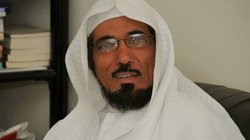 Amnesty International has called for the immediate and unconditional release of prominent Saudi dissident Muslim cleric Sheikh Salman al-Awdah, as a crackdown led by Crown Prince Mohammed bin Salman against pro-democracy campaigners, Muslim preachers and intellectuals continues in the country.
Amnesty International has called for the immediate and unconditional release of prominent Saudi dissident Muslim cleric Sheikh Salman al-Awdah, as a crackdown led by Crown Prince Mohammed bin Salman against pro-democracy campaigners, Muslim preachers and intellectuals continues in the country. RNA - “The hearing of Sheikh Salman al-Awdah has been adjourned again after a year of several postponements. We continue to demand Saudi authorities to release the Sheikh immediately and unconditionally, drop all charges against him, and respect international human rights standards in his trial,” the London-based organization said in a post published on its Twitter page on Friday.
On July 28, Saudi Arabia’s Specialized Criminal Court postponed a hearing in the case against Sheikh Awdah until December amid growing concerns he would be sentenced to death.
Last week, Amnesty International warned the Saudi regime against executing the dissident cleric, calling on Riyadh to drop the politically-motivated charges leveled against him.
“We are gravely concerned that Sheikh Salman al-Awdah could be sentenced to death and executed. Since his arrest almost two years ago, Sheikh al-Awdah has gone through a terrible ordeal, including prolonged pre-trial detention, months of solitary confinement, incommunicado detention, and other ill-treatment – all flagrant violations to his right to a fair trial,” Lynn Maalouf, the Middle East Research Director at Amnesty International, said on July 26.
The Arabic-language Saudi newspaper Okaz reported on September 4, 2018 that Saudi public prosecutors had leveled 37 counts against Awdah, and even demanded his execution.
According to Press TV, Saudi authorities detained the prominent Muslim scholar on September 7 last year and have been holding him in solitary confinement without charge or trial ever since. Officials have imposed travel bans on members of his family as well.
A family member told Human Rights watch that the distinguished cleric was being held over his refusal to comply with an order by Saudi authorities to tweet a specific text to support the Saudi-led blockade of Qatar.
Awdah, instead, posted a tweet, saying, “May God harmonize between their hearts for the good of their people,” - an apparent call for reconciliation between the Persian Gulf littoral states, the US-based rights group said in a statement.
Saudi Arabia, the United Arab Emirates, Bahrain and Egypt all cut off diplomatic ties with Qatar on June 5 last year, after officially accusing it of “sponsoring terrorism.”
Qatar said the move was unjustified and based on false claims and assumptions.
Saudi Arabia has lately stepped up politically-motivated arrests, prosecution and conviction of peaceful dissident writers and human rights campaigners.
Over the past years, Riyadh has also redefined its anti-terrorism laws to target activism.
Saudi regime forces arrest two Shia activists, run over elderly woman in Qatif
Meanwhile, Saudi regime forces have arrested two anti-regime activists and run over an elderly woman from the kingdom’s oil-rich and Shia-populated Qatif region in Eastern Province.
Informed sources, requesting not to be named, said Saudi forces ran over the woman, whose identity was not immediately available, near al-Karama roundabout in the town of al-Awamiyah on July 31, Arabic-language Mirat al-Jazeera news website reported on Friday.
She was rushed to hospital for treatment, and her fate remains unknown ever since.
Separately, Saudi forces detained Zakaria Mohammed al-Bannawi, a resident of Awamiyah, upon his return from the holy city of Medina on July 2.
Bannawi was arrested without knowing the main reasons for this arbitrary arrest, which was carried out without providing an arrest warrant or a summons.
The report comes as Saudi authorities have been holding social activist Dargham Abdullah al-Ahmad since July 4. He was arrested during his travel to Kuwait. The main reasons for his arrest have not been clarified yet.
Eastern Province has been the scene of peaceful demonstrations since February 2011. Protesters have been demanding reforms, freedom of expression, the release of political prisoners, and an end to economic and religious discrimination against the oil-rich region.
The protests have been met with a heavy-handed crackdown by the regime, with regime forces increasing security measures across the province.
847/940